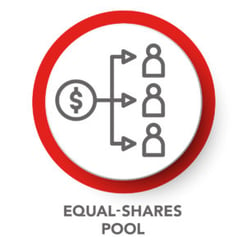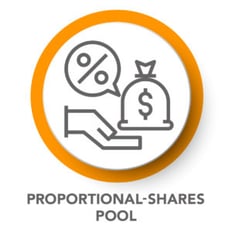
What’s an MLM Pool Commission? [And How it Can Fit in Your Compensation Strategy]
What’s an MLM Pool Commission? [And How it Can Fit in Your Compensation Strategy]
If you’re looking for a way to fill in the commission gaps of your direct selling compensation plan, it’s a good idea to consider adding a pool commission to your strategy. Adaptable, targetable, and flexible, pool bonuses make it easy to encourage specific actions while keeping your budget on track. We’ll help you become a pool expert by going over the basics as well as some tips for knowing if this commission type and your company are a good fit.
The Basics
Simply put, a pool commission (or pool bonus, as it’s sometimes called) pays distributors from a pre-defined pool of money set aside just for that commission. Generally, this is a percentage of company volume or company commissionable volume. Like all commission types, pools have certain rules that must be met to qualify for earnings. But, unlike other types, the payouts for pools are determined by the number of people who meet the requirements.
There are two kinds of pool commissions you should know about before you get started—the equal-shares pool and the proportional-shares pool. They’re both useful, but in different ways.
Equal-shares pool
In the equal-shares pool, payment is based on following certain rules. Everyone who does gets an equal part of the commission. If the total value of the pool is $100 and 10 people qualify for shares, they each get a $10 bonus.
Some plans take this concept a step further and let distributors earn multiple shares, each worth the same amount. For example, maybe your distributors earn one share of the pool commission for each customer who bought a certain item in a given month. If three of a distributor’s customers purchased the product, she’ll earn three shares of the commission payout.

Equal-shares pools are good for bigger distributor groups and used for a smaller, short-term incentives—if distributors are counting on a big check and too many people qualify, the amount each distributor gets will lower and your pool commission won’t be nearly as effective. Instead, promote it as a special boost or short-term goal. That way, it’s more of an additional reward, rather than a big check your distributors are counting on.
Proportional-shares pool
Proportional-shares pools are similar to equal-shares pools, but there are some important differences. For one, a proportional-shares pool pays distributors in proportions, rather than equal shares. And, in a lot of cases, this pool type lets distributors earn what they get, instead of paying them out of an amount that’s been set aside.
Let’s compare the two with an example. In an equal-shares commission, it’s more likely that the company establishes the pool amount up front, as a part of their compensation budget. In the proportional-shares commission, the pool isn’t created until distributors have earned the money that goes into it. In our proportional-shares example, the company might decide that their payment pool is 50% of the sales of autoship orders, for example. Remember that, for this type of pool, the payout amount is based on the proportion of total earnings that a given distributor contributes.
In our example of selling autoship orders, let’s say a distributor sells $2,000 worth of autoships in a commission run. If the total sales from everyone in the company adds up to $20,000, she’ll have earned 1/10th of that total. So, she gets the same proportion in commissions from the payment pool—1/10th.

So, how much has she earned? Well, that depends on the payment pool rules. If a company decides to create the payment pool by setting aside 50% of the autoship sales money, the total payout amount company-wide will be $10,000 (half of the amount earned across the salesforce, which was $20,000). How much does our distributor get? Because she earned 1/10th of the total sales, she’ll take home 1/10th of the payment pool, which is $1,000.
Because the payout for proportional-shares pools works differently than the equal-shares kind, it usually works better for a smaller group of people looking to make a bigger check, likes sales leaders or dream builders.
Common Pool Dangers
Now that you know all you need about the different kinds of pools, you might be itching to try one for yourself. But before you throw on your swimsuit and launch your new pool commission, here are some common pitfalls to watch out for:
Unknown earnings
A lot of commission types give distributors a general idea of what they can earn in a commission run, but a pool is not one of them. Payout is affected by a lot of factors—how many people qualify, how long the pool runs, the rules etc. The earnings of a new, fast-growing distributor or some other kind of unexpected increase can upset the balance of the pool and change the payout drastically. This is why using a pool as an addition to your compensation strategy is so important—it should be more of a positive bonus, rather than an unpredictable salary.
Low-value shares
This is more of a problem with equal-shares pools—too many people qualifying for the pool can mean that there’s less of it to go around. In the worst cases, this can result in completely worthless shares. A lot of MLMs counteract this by basing the pool payout off of company-wide earnings in a commission run, but it’s still not a guarantee. Careful planning and data monitoring are better preventative actions. Performance trends will help you decide when to amp up a pool commission and when it’s no longer effective.
So, remember—use this commission as the dessert of your strategy, not the main course. Plan ahead and consider how it’ll fit into the rest of your plan to keep your distributors busy and your business running smoothly.
Is a pool commission right for your business? If you’re looking for a smart way to motivate specific distributor groups and add an exciting new element to your direct selling compensation plan, dive in!
To learn more about our commissions consulting services, click here. For more on pool commissions and compensation strategies, we invite you to read Mark Rawlins’s book From Commission Plan to Compensation Strategy.


VP, Consulting Services, InfoTrax Systems
Steven Hooper is Vice President of Consulting Services at InfoTrax Systems. He’s worked as senior vice president, chief compensation strategist, controller, and compliance officer and headed up the technology and commissions groups for two global hypergrowth companies. Steve has a Bachelor of Science in Accounting and a Master’s in Accounting Information Systems. After launching a career in public accounting, Steve joined the direct selling industry and quickly acquired a passion and expertise for developing, implementing, and analyzing strategies in compensation, business information systems, and global market expansion.



